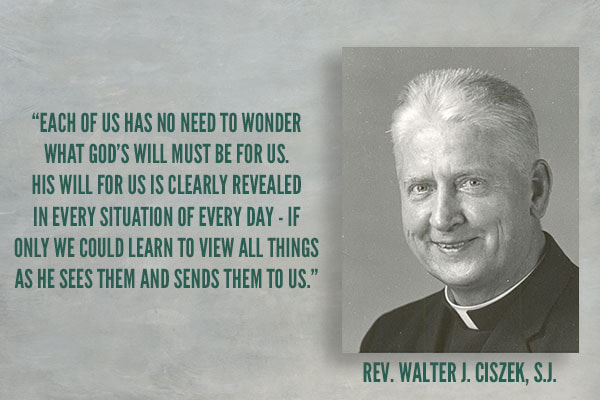|
Bread and Water
Once there was a scrappy Polish kid from Shenandoah, PA named Walter Ciszek. Walter came from a devout Catholic family, but Walter was tough. He liked to pick fights. Had he grown up in different circumstances, he might have ended up in a street gang, but being raised in a good Catholic home (dad took him down to the police station once and asked them to send him to reform school!), he eventually channeled his toughness into challenging ascetical practices. During Lent one year, for example, he decided to live on just bread and water, just to prove to himself that he could do it. To everyone's surprise, he entered the seminary after high school and then determined to join the Jesuit order. Physically and mentally strong, Walter Ciszek would need every ounce of his God-given strength to face the desperate, excruciatingly painful years ahead. Twenty-three Years in Hell In the years following the Russian Revolution, when so many Catholic clergy had been murdered and imprisoned, Pope Pius called for volunteer priests to be ordained under the Byzantine rite and become missionary priests in that war-torn country. The tough kid from Shenandoah jumped at the chance. Immediately he knew this was God's will for his life. But the Second World War was fast approaching, and the Russian tanks plowed into Poland, where Fr. Walter was assigned. Agonizing over what to do, not wanting to leave his parishioners, he finally decided Russia was where he belonged after all. But shortly after entering Russia from occupied Poland, Father Walter was arrested as a spy. He was held in solitary confinement in Moscow's infamous Lubianka prison for five brutal, punishing years. Finally cracking under the endless pressure of starvation, emotional isolation, and relentless interrogations, he "confessed" to being a spy for the Vatican. His sentence: fifteen years at hard labor in the frozen wasteland of Siberia! Incredibly, at first he was relieved at this sentence, just to be out of solitary and able to interact with other people once again. Suffering 23 years of misery in the form of extreme cold and starvation, living among hardened criminals who would kill in a heartbeat, Father Walter was released and eventually swapped with two Russian prisoners. Returning to the U.S. in 1963, he spent the rest of his life teaching at Fordham University, giving spiritual direction, and writing. With God in Russia is the detailed story of his youth, his vocation to the priesthood, his burning desire to go to Russia as a missionary. The book recounts the long years of imprisonment with incredibly vivid and specific recollection, finally relating his eventual release. He Leadeth Me, Father Walter's second book, tells the same story but from a more spiritual perspective. Having read both books, I highly recommend both of them. World War II buffs will especially enjoy the first one as it provides much more detail about the ongoing situation in Russia during the war years. He Leadeth Me is shorter and offers more personal insights about Father Walter's spiritual metamorphosis over the course of his long ordeal. Surrendering to God's will in all things and relying completely on God's providence, Father Walter miraculously survived the extreme conditions in the wartime Russian prison system while finding the strength to minister to Eastern Catholics who had no access to priests or the sacraments due to the atheistic Communist government having outlawed the practice of religion. For anyone who has struggled with reconciling the problem of evil with a loving God, Father Walter's moving story will inspire you with the incredble strength of the human spirit in the face of profound physical, emotional, and spiritual challenges. Father Walter Ciszek has been declared a Servant of God by the Catholic Church, and his cause for canonization is in process. For more information on Father Walter, including testimonials and instructions on how to join the Father Walter Ciszek Prayer League, visit www.ciszek.org.
0 Comments
I would like to take a break from all this AI-conspiracy nonsense to wish myself, and all of you, a Happy Birthday. You will perchance protest that today is not your birthday. No matter. Bookmark this blog post, calendar it for the anniversary of your official entrance into the world, and come back then--especially those of you who are feeling a bit long in the tooth. If you don't know what that means, never mind. You probably aren't in the demographic I'm talking to anyway. What then? Shall we sit idly down and say The night hath come; it is no longer day? The night hath not yet come; we are not quite Cut off from labor by the failing light; Something remains for us to do or dare; Even the oldest tree some fruit may bear; Not Oedipus Coloneus, or Greek Ode, Or tales of pilgrims that one morning rode Out of the gateway of the Tabard Inn, But other something, would we but begin; For age is opportunity no less Than youth itself, though in another dress, And as the evening twilight fades away The sky is filled with stars, invisible by day. – Henry Wadsworth Longfellow [To read the first post in this series, go back to October and work your way up.] After reading the above Acknowledgement page in Danny Dunn and the Homework Machine, published in 1958, one wonders (or is it just me?) why writing a simple children's chapter book in the late 1950s would require a tour of the computer room at IBM, at the time the biggest and most influential computer corporation in the world. One wonders why the authors would feel the need to hire a Ph.D.-level manager at IBM to "painstakingly" read the manuscript in advance of publication. Painstakingly? To prevent a fatal error of fact in a fictional work for children? Why? Today, nearly every school in America has technology-assisted classrooms, and nearly every student can turn to the internet for help with homework, but back in the fifties it truly was the stuff of science fiction. Even 2001: A Space Odyssey, with its HAL-computer-run space station and supercool videophones, wouldn't hit the bookstores for another ten years. There has to be more to this than a couple of writers, whose Danny Dunn series up to that point included such scintillating titles as Danny Dunn on a Desert Island, deciding to get a little crazy at IBM. But maybe not. Maybe I'm just getting unreasonably paranoid and cynical in my golden years. Maybe it was just a coincidence that a simple book for kids written in 1958 posed an ethical dilemma that wouldn't actually exist in the real world for another fifty years. In the end it doesn't really matter. What matters is that everyone who cares about children and cares about the direction our society is racing like so many internet-addicted sheep to the edge of a not-far-off cliff takes note of the fact that the science fiction of today can unexpectedly become the reality of tomorrow, and that the limitless dreams of rich, brilliant men hungry for change, power, and control have set an agenda that will strip mankind of its very humanity, and no, I am not engaging in hyperbole for the sake of shock value. How many of you have ever heard of transhumanism, know who is behind it, and have any clue what its implementation means for the human race? I'll be willing to bet not many. I refuse to add to their internet presence by linking to the Wikipedia article on transhumanism, but you can look it up. Be prepared, though. It's not a short piece. In the fifties, the best computers were mainframe computers. They were huge. The bigger, the better. IBM was the undisputed leader in that field until microcomputing became the thing in the late 1970s. Then, Micro (get it?) Microsoft took over, and Apple and all the rest. Computers became smaller and smaller, and faster and faster. Now we have nano (as in really small) computing, which lets doctors inject little robotic antibodies into our arteries that can go around and do nanosurgeries. And wearables and smart glasses and Siri and Alexa and on and on and on. I actually heard some educated type being interviewed on NPR last year state that she had no problem with robots being physically intimate. I still haven't quite recovered from that one. I did not set out to write a blog about current social issues in education, about the horrific intrusion of technology, or even about children's books. But as sometimes happens, one thing leads to another, and you have the Law of Unintended Blog Posts exercising its authority over lowly amateur writers like me. In other words, I want to finish this endless Danny Dunn Down-the-Rabbit-Hole post and get on with what I really want to be blogging about, which is religious life. Like writing about Apple, Microsoft, Google, and Amazon, to write about technology in the twenty-first century would be like trying to write the 15- (or is it 14- ?) volume The Liturgical Year by Dom Gueranger, the first Abbot of Solesmes. Could it be done? Yes. Ought one to try, when one has other more pressing issues to raise? No. So let me conclude here by urging you to research this most insidious of evils, transhumanism, and asking yourself how you can fight against it in your own life and in the lives of your children and grandchildren, who in the next twenty years will inevitably be faced with decisive moral choices regarding the role of technology that we Boomer dinosaurs can't even begin to imagine. Once upon a time in a magical place called Sugarloaf, there lived a Great King and His all-pure mystical brides. It was in December, they say, about a week before the Feast of the Great King's Nativity, when a poor woman from far away knocked on their door, seeking shelter. "We have plenty of room--you can live with us!" the mystical brides smiled kindly. And they did, and she did, and they all lived happily ever after. (So far, anyway.)
|
Archives
June 2023
Categories
All
The opinions expressed on this website are my own personal views and do not necessarily represent those of the Catholic Church.
If I have erred in any statement, whether directly or by implication, in any matter pertaining to faith or morals, I humbly invite fraternal correction. |






 RSS Feed
RSS Feed
